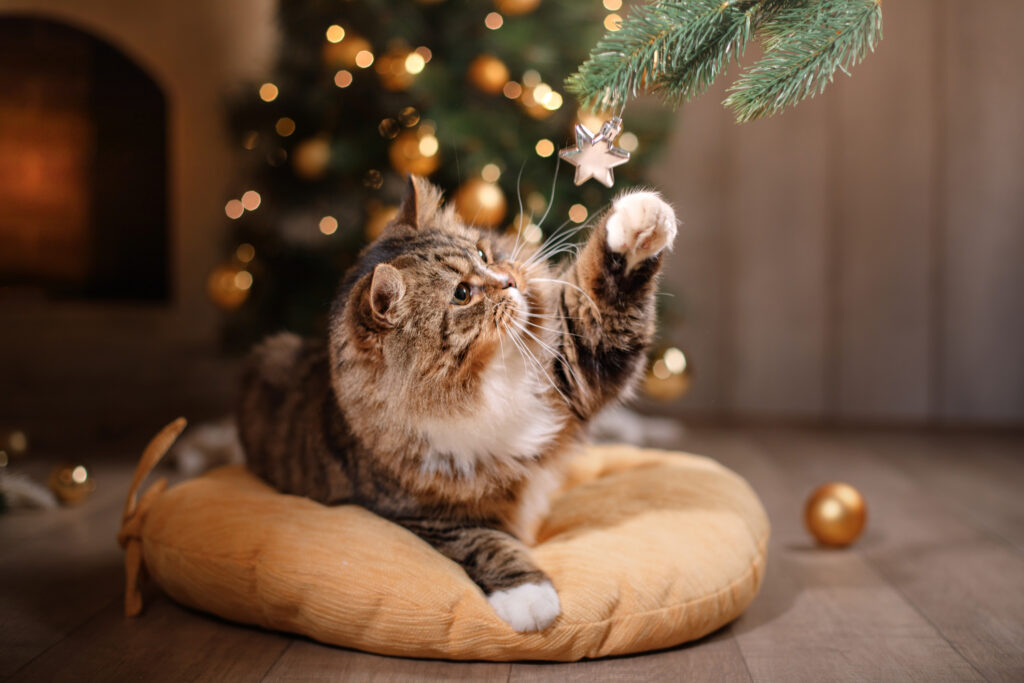Press Release
19 December 2023
BVNA reminds owners to be alert to hidden festive dangers at Christmas

The British Veterinary Nursing Association (BVNA), the voice of the veterinary nursing profession, reminds owners and caregivers of the hidden festive dangers for their pets. Many of the traditional foods, decorations and presents we love to have in our homes at Christmas may pose real threats to our pets’ health, so taking some simple precautions will help owners to avoid an emergency vet visit during the festive season.
As we all get ready for the upcoming festive period, spare a moment to think about the hidden dangers around your house that may result in spending Christmas with your vet.
Festive foods
Hopefully you are already aware of the dangers of chocolate to our canine friends – so remember to keep your advent calendars out of reach, as well as your boxes of chocolates or chocolate Christmas tree decorations. Don’t forget that raisins, sultanas, dates and grapes – which may be in your Christmas cake, mince pies and Christmas pudding – are also toxic to dogs and cats.
We all like to involve our pets in the Christmas celebrations – but don’t be tempted to give them a portion of your Christmas dinner. Foods which are high in fat may give them diarrhoea, gastroenteritis, or even pancreatitis – which is a very painful condition. Onions and garlic are also toxic, and may not be immediately obvious – usually found in gravy or stuffing. Remember also that cooked bones are quite brittle and may splinter in your pet’s digestive tract, causing cuts and potentially perforation of the digestive tract. Your pets will be more than happy with dog and cat specific treats, especially if it is something special.
The sweetener xylitol is a common substitute for sugar, and can be found in sugar-free/low sugar sweets, chewing gum and even some types of peanut butter. Even ingestion of a very small amount can be fatal to dogs, so ensure these foods are kept well out of reach.
A great trick to give dogs hours of fun is to put some tube cheese into a toy such as a Kong, with some chopped up carrot or even soak some of their dry food in water. Once the food has absorbed the water, place the soggy biscuit into a toy and place in the freezer for a couple of hours. It will keep them occupied whilst you enjoy your Christmas dinner, or festive treats of your own!
Objects around the home
If your pet plays with and manages to grab some of the Christmas decorations from the tree and ingest them, this can possibly cause blockages or severe abdominal cramping. Bizarrely, some cats seem to enjoy eating tinsel and owners may be unaware until they appear unwell. Pine needles themselves can also cause gastrointestinal upset or injury, so ensure you vacuum around the Christmas tree regularly.
Pets may also be desperate to join in the fun playing with new Christmas presents and toys. However, be vigilant about leaving children’s toys unattended – if a pet chews on a toy with sharp plastic or batteries, this can cause injury to their mouths, or chemical burns to their mouth and digestive system.
Changes in routine
With lots of new visitors to the house, lots of noise and a change from usual routine, remember that pets may not enjoy Christmas as much as we do. Try to ensure they always have a familiar place to feel safe and hide away if they need to, and where possible, try to keep to your usual routine as much as you can.
Once Christmas is over and we move towards New Year, there is also a good chance of fireworks going off nearby. You should ensure your pets are inside, away from the noise. You can put background music on for them or keep them occupied with the family. If you know they become distressed with loud noises, speak to your vet about whether they need any extra help to reduce their anxiety. BVNA recently released a podcast with more advice about managing your pet during fireworks season, you can listen here: https://on.soundcloud.com/95BFx.
What if my pet becomes ill?
If you are worried your pet may have ingested something, or if they become ill, contact your vet for advice. Whether your practice provides their own emergency/out of hours service, or make use of an external service – there will always be a vet on hand if you should need them.
A useful tip is to have your veterinary practice’s emergency number in your phone, just in case. If your practice uses an external out of hours service, make sure you know where they are – it may not be at the premises you usually visit with your pet.
It might seem like there is lots to worry about, but being mindful of these potential hazards will make it a lot easier to enjoy Christmas with your pet. Ease the fullness feeling by taking your dog for a walk after Christmas lunch, or play ‘fetch’ with your cat – they can help you to unwind.
From all at BVNA, we wish you all a wonderful Christmas time and have a great New Year.
